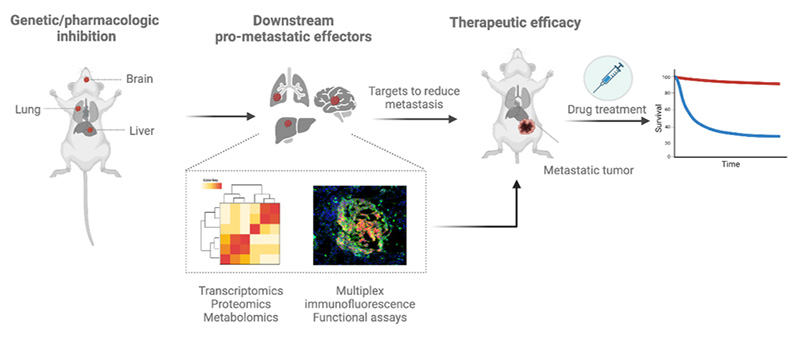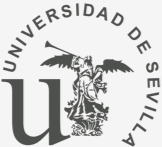Metabolic Regulation and Signaling in Cancer
Research focus
Metastasis is the major cause of death in patients with cancer. A better understanding of the mechanisms driving metastasis is critical to develop more effective anti-cancer treatments. Our lab is focused on understanding how metastasizing cells successfully adapt to the changing environments they encounter after leaving the primary tumor. In this regard, several nutrients and metabolites available at the distant organ have been implicated in supporting the nesting of metastasizing cancer cells. Moreover, both cell-intrinsic and environment-influenced factors intensify heterogenic metabolic reprogramming in tumor cells to fuel invasion, survival and seeding in the distant organ. In our laboratory we are currently pursuing several research lines designed to investigate how these cell-intrinsic and -extrinsic (environmental) factors promote metabolic reprogramming and regulate signaling events in metastatic cells. Our ultimate goal is to find new therapeutic targets to prevent and treat metastatic cancers.

These research lines can be divided into two main categories:
- Metabolites as signaling drivers. Cancer metabolism is very plastic and context specific. We have described mechanisms by which cancer cells metabolically change during the progression of cancer: from heterogeneous conditions in the primary tumor to adaptation to changing metabolic sources and environments affecting important regulatory pathways for proliferation and metastasis. However, we have also learned that, aside from fulfilling metabolic pathways important to cell growth and survival, some nutrients can also regulate many biological processes through protein post-translational modifications (PTMs). In this regard, we found that disseminated breast cancer cells divert metabolic sources to sustain aberrant integrin glycosylation which is needed to initialize metastasis (Rossi. M*, Altea-Manzano P* et al., Nature 2022). In addition, we discovered that palmitate drives specific protein acetylation promoting lung metastatic colonization (Altea-Manzano P et al., Nat Cancer 2023). These observations suggest alternative roles for metabolites in metastasis beyond traditional biosynthetic and energy pathways, acting as signaling molecules driving PTMs. How do metabolite-driven signaling events drive cancer progression? Our goal is to investigate this unconventional role in key metabolites by using multi-omics approaches and in vivo metastatic models. We focus on the fatty acid palmitate, which is the source of the reversible PTM called S-palmitoylation and has a unique pro-metastatic effect compared to other fatty acids with similar metabolic fates. We are studying how palmitoylation dynamics orchestrate cellular processes altered in metastasis.
- Factors shaping the local environment. Diet, which is the main source of nutrient input for organ systems, can affect organ and metabolite homeostasis and it can influence tumor behavior. Several common dietary components can impact the metabolism of distant organs and cellular mechanisms toward the development of metastasis (Vandekeere et al. Annu. Rev. Cancer Biol 2024, Altea-Manzano et al. EMBO Rep. 2020). Notably, high-fat diet exposures have been linked to cancer susceptibility and progression. However, identifying mechanistic links between dietary nutrients and metastasis remains challenging. We have discovered that high-fat diet exposure changes the metabolic composition of organs of metastasis regardless of the presence of cancer cells. Our goal is to mechanistically define how the organs of metastasis change due to high-fat diet exposure, and how these changes can boost metastasis formation.
Financial support
- European Research Council (ERC Starting Grant)
- Agencia estatal de Investigación (Ramón y Cajal Program)
- Ministerio de Ciencia, Innovación y Universidades (PDI-FPI)
- Fundación FERO
- Asociación Española Contra el Cancer (Predoctoral Program)
If you are interested in joining our group as master student, PhD student or Postdoc, please send us your CV, motivation letter and contact details of two referees to: patricia.altea@cabimer.es
Selected publications:
- Altea-Manzano P#, Decker-Farrell, Janowitz T & Erez A#. Metabolic interplays between the tumor and the host shape the tumor macroenvironment. 2025 Nat. Rev. Cancer 10.1038/s41568-024-00786-4
- Doglioni G, Fernández-García J*, Igelmann*, Altea-Manzano P*, et al & Fendt SM. 2025. Aspartate signalling drives lung metastasis via alternative translation. Nature. Feb;638(8049):244-250. 10.1038/s41586-024-08335-7
- Puente-Corbacho B., Esteo C, Altea-Manzano P, et al., & Vera-Ramirez L. 2025. De novo lipogenesis protects dormant breast cancer cells from ferroptosis and promotes metastasis. Redox Biology. 10.1016/j.redox.2024.103480
- Vandekeere A*., Karraz SE*, Altea-Manzano P*# & Fendt S-M#. 2024. Metabolic rewiring during metastasis: the interplay between environment and host. Annual Review of Cancer Biology Vol. 8, pp. 269–290.
- Altea-Manzano P, Doglioni G, Lui Y, et al. & Fendt S-M. 2023. A palmitate-rich metastatic niche enables metastasis growth via p65 acetylation resulting in pro-metastatic NF-κB signaling. Nature Cancer. 10.1038/s43018-023-00513-2
- Altea-Manzano P, Vandekeere A, Edwards-Hicks J, et al. & Finch A. 2022. Reversal of mitochondrial malate dehydrogenase 2 enables anaplerosis via redox rescue in respiration-deficient cells. Molecular Cell 31;S1097-2765(22)00962-5. 10.1016/j.molcel.2022.10.005
- Rossi. M*, Altea-Manzano P*, Demicco M, et al. & Fendt S-M. 2022. PHGDH heterogeneity potentiates cancer cell dissemination and metastasis. Nature 605(7911):747-753. 10.1038/s41586-022-04758-2
- Lui Y., Vandekeere A., Xu M., Fendt S-M# & Altea-Manzano P#. 2022. Metabolite-derived protein modifications modulating oncogenic signaling. Frontiers in Oncology 23;12:988626. 10.3389/fonc.2022.988626
- Cano-Cortes MV*, Altea-Manzano P*, Laz-Ruiz JA*, et al & Sanchez-Martin RM. 2021. An effective polymeric nanocarrier that allows for active targeting and selective drug delivery in cell coculture systems. Nanoscale 13(6):3500-3511. 10.1039/d0nr07145e
- Altea-Manzano P, Cuadros AM, Broadfield LA & Fendt S-M. 2020. Nutrient metabolism and cancer in the in vivo context: A metabolic game of give and take. EMBO Reports 21(10):e50635. 10.15252/embr.202050635
- Altea-Manzano P, Unciti-Broceta JD, Cano-Cortes V, et al. & Sanchez-Martin RM. 2017. Tracking cell proliferation using a nanotechnology-based approach. Nanomedicine 12(13):1591-1605. 10.2217/nnm-2017-0118
Full list of publications:
ORCID ID: https://orcid.org/0000-0002-7075-2051
https://scholar.google.es/citations?user=7HGWTMcAAAAJ&hl=es&oi=ao








